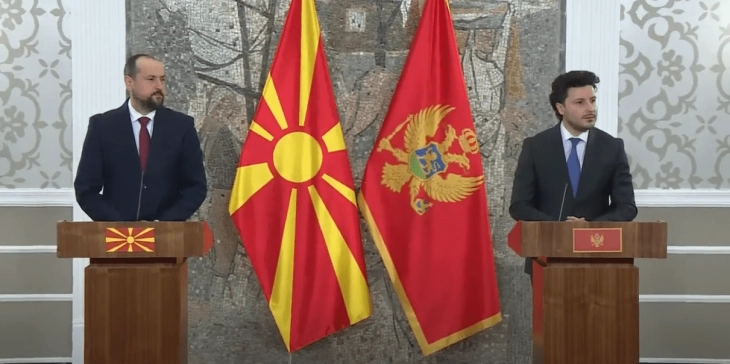Bytyqi-Abazović: Bilateral and regional cooperation should continue to enhance

Skopje, 2 December 2021 (MIA) – Relations between North Macedonia and Montenegro are excellent and can serve as an example for all Western Balkan countries. However, they have to continue to improve, through enhanced cooperation, especially in the sector of economy, in order to promote the living standard in both countries. Both countries have to continue to support regional initiatives and cooperation, as an added motivation for speeding up the EU integration process, said North Macedonia’s Deputy PM for Economic Affairs Fatmir Bytyqi and Montenegro’s Deputy PM Dritan Abazović after a meeting in Podgorica.
“We have a lot of things in common. We live in the same region. We have the same aspirations and face similar challenges. When Deputy PM Abazović visited North Macedonia in March, we pledged to resume efforts to intensify bilateral relations, with the goal of further development in the Western Balkans. At out previous joint press conference we discussed regional competitiveness vs. regional competition. In that regard, we have exchanged experiences aimed at improving and strengthening the business environment, not just at national level, but in the Western Balkan region,” Bytyqi told the press briefing.
According to him, the region has an excellent opportunity to make use of its advantages in the post-covid period and position itself as a peaceful and stable region, where everyone cooperates and shares the same democratic values.
“We have to set an example of a competitive region that continues to increase its participation in global economy and attracts investors. Individually, we’re all relatively small countries with limited markets and capacities, but together we’re already becoming an attractive destination for investors. We have to understand that the majority of European companies learned their lesson during the pandemic and are thinking of moving supply chains closer to their borders and we are positioned exactly on the borders of the EU,” the Deputy PM underlined.
He briefed that interlocutors agreed at Thursday’s meeting that every company in the region should be treated as a domestic company and be offered equal conditions.
“Moreover, by establishing affirmative and stimulating measures and encouraging them to connect, we’ll set up a strong value chain across the region. Shifting focus to stimulating investments in the Western Balkans is set to create a resilient and stable regional market, that can compete with the European and global market, while at the same time support and enhance national economies. Strong value chains are the competitive advantage of the Western Balkans in the post-covid period,”
Montenegro’s Deputy PM Dritan Abazović said after the meeting that relations between North Macedonia and Montenegro are excellent and can serve as an example for the rest of the Western Balkan countries.
“It’s our wish and ambition to have similar relations with other countries. Cooperation between governments should enhance, so that we can send the message to the rest of the region that we can cooperate, be friends and not see each other as competition, but as partners, brothers and sisters,” Abazović noted.
He added that interlocutors also discussed on Thursday the economy and regional connectivity, as an important political aspect for the EU integration of both countries.
“I think that we have to enhance trust, support regional initiatives, try to remove all the barriers in the Western Balkans and treat the region as a single economic zone,” the Deputy PM stressed.
In regard to regional cooperation, he underlined that it can’t hurt anyone.
“This is a negative political story that keeps being repeated and can endanger the identity of every country and disrupt relations at home. Less borders, barriers, administration and increased cooperation, greater mobility, facilitated access and joint application for regional projects, especially in infrastructure and energy, will benefit everyone,” Abazović said when asked whether support for regional initiatives means support for Open Balkans.
“This,” he added, “is my personal opinion.”
According to him, North Macedonia is part of the initiative, which is not meant to replace the EU, but present a way to join it faster.
Bytyqi, his office said, will take part on Thursday in the Central European Initiative's summit for heads of governments.
During his visit to Montenegro, the Deputy PM will also meet with Montenegrin Minister of Finance and Social Welfare Milojko Spajić.







